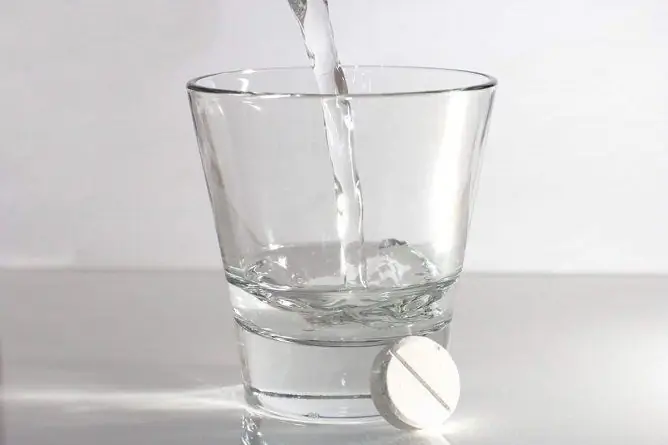- Author Rachel Wainwright wainwright@abchealthonline.com.
- Public 2023-12-15 07:39.
- Last modified 2025-11-02 20:14.
Urethritis in women
The content of the article:
- Causes of urethritis in women
- Forms of the disease
- Symptoms of urethritis in women
- Urethritis in girls
- Diagnostics
- Treatment of urethritis in women
- Treatment of urethritis in women with folk remedies
- Potential consequences and complications
- Forecast
- Prevention
Urethritis in women is an inflammatory process that affects the walls of the urethra, that is, the urethra. In women, the disease occurs almost with the same frequency as in men, but due to the worn out symptoms, women in many cases do not go to the doctor, and it remains unrecognized. Prognostically, this is unfavorable, since the lack of timely and adequate treatment contributes to the chronicity of the inflammatory process, creates the preconditions for the development of an ascending urinary tract infection.
Urethritis in women often occurs simultaneously with cystitis. This is due to the fact that the urethra in women is short (only 1-2 cm) and wide. Therefore, infectious agents from it easily penetrate into the bladder, causing its inflammation.

Urethritis is an inflammation of the urethra
Causes of urethritis in women
The most common cause of urethritis in women is infection; viruses, fungi, and bacteria act as agents. Much less often, the disease is non-infectious. In this case, the causes of its occurrence may be:
- neoplasms of the urethra;
- urolithiasis (damage to the walls of the urethra by passing urinary calculi);
- allergic reactions to detergents and cosmetics;
- rough intercourse;
- irritation of the walls of the urethra during urological procedures (cystoscopy, bladder catheterization);
- gynecological diseases (colpitis, vulvitis).
The route of transmission for infectious urethritis in women can be sexual (the infection is transmitted from an infected partner during unprotected intercourse) or hematogenous (the infection is brought into the urethra with blood flow from the focus of the primary infection in the body).
There are a number of factors that increase the risk of urethritis in women. These include:
- decreased immunity against the background of long-term serious diseases;
- hypovitaminosis conditions;
- irrational and unbalanced nutrition, including adherence to mono-diets;
- neglect of the rules of personal hygiene;
- the presence of foci of chronic infection in the body (untreated carious teeth, chronic tonsillitis, chronic sinusitis, tuberculosis, etc.);
- trauma to the external genital organs;
- diseases of the genitourinary system;
- psycho-emotional overload;
- hypothermia;
- pregnancy;
- alcoholism.
Forms of the disease
Depending on the cause, urethritis in women is divided into infectious and non-infectious. Infectious urethritis, in turn, is of several types:
- nonspecific - caused most often by E. coli, streptococci or staphylococci and proceeds as a classic purulent inflammation;
- specific - is one of the symptoms of sexually transmitted diseases (mycoplasmosis, chlamydia, trichomoniasis, gonorrhea, candidiasis);
- viral - caused by the herpes simplex virus or human papillomavirus (HPV).

Candidiasis can lead to the development of specific urethritis in women
According to the duration of the course, urethritis in women is divided into acute and chronic.
Symptoms of urethritis in women
Urethritis in women occurs in most cases with minimal clinical signs of inflammation, and often generally asymptomatic. This is due to the fact that the female urethra is wide and short, and during each urination the microbial flora is well washed out of it.
The main symptoms of urethritis in women are:
- soreness and burning sensation that occur from the beginning of urination and persist for some time after it ends;
- hyperemia (redness) of the external opening of the urethra, and sometimes the external genital organs;
- discharge from the urethra of a purulent character from whitish to yellow-green color (the color depends on the type of pathogen);
- itching of the vagina and vulva.
General symptoms of urethritis in women, such as fever, weakness, muscle pain, are absent in the uncomplicated form of the disease.
A symptom of chronic urethritis in women is usually mild suprapubic tenderness.
Urethritis in girls
In girls, the inflammatory process from the urethra quickly spreads to the bladder, leading to the development of cystitis. Therefore, in pediatric urology, inflammation of the urethra in girls is usually called urethral syndrome, since in most cases it is not possible to accurately determine the localization of the inflammation focus.
The following factors can lead to the development of urethritis in childhood:
- synechia of the labia minora;
- irregular urination;
- urolithiasis disease;
- hypothermia;
- abuse of salty or spicy foods;
- violation of hygiene rules.
One of the main symptoms of urethritis in young girls is urinary retention. Because of the expectation of pain, little patients refuse to sit on the potty or go to the toilet, and cry when urinating.

One of the signs of urethritis in girls is urinary retention.
With uncomplicated urethritis, the general condition of the girls does not suffer. The development of complications can be accompanied by fever and the appearance of symptoms of intoxication.
Diagnostics
Diagnosis of urethritis in women is usually difficult, since the disease proceeds with an erased clinical picture and patients often seek medical help already at the stage of complications. During a gynecological examination, you can see redness of the external opening of the urethra and the appearance of minor discharge from it at the time of palpation. To confirm the diagnosis and identify the cause of the disease, a laboratory and instrumental examination is carried out, which includes:
- general analysis of blood and urine;
- urine analysis according to Nechiporenko;
- bacteriological examination of urine, which allows identifying the causative agent of the disease, as well as assessing its sensitivity to antibacterial drugs;
- examination of scraping from the urethra by PCR;
- urine analysis for mycobacterium tuberculosis;
- urethroscopy (examination of the urethra with a special endoscopic device);
- ultrasound scanning of the pelvic organs.

To diagnose urethritis in women, urine analysis is performed according to Nechiporenko
Treatment of urethritis in women
With uncomplicated urethritis in women, treatment is carried out on an outpatient basis. Antibiotics, antiviral or antifungal agents are prescribed, taking into account the sensitivity of the pathogen. The main groups of drugs for the treatment of urethritis in women are fluoroquinolones, macrolides, cephalosporins, sulfonamides. With fungal urethritis, Clotrimazole, Amphoglucamine, Nystatin, Levorin are used, with urethritis of a viral nature - Penciclovir, Acyclovir, Ganciclovir or Famciclovir.
Women with urethritis are advised to limit the use of spicy, salty and spicy foods. During the day, you should drink at least 1.5 liters of liquid. In addition, during the period of treatment, it is necessary to refrain from sexual intercourse, avoid hypothermia and strictly observe personal hygiene.
Treatment of chronic urethritis in women should be comprehensive and long-term. It includes:
- prescribing antibiotics based on antibiotic data;
- fortifying, immunity-stimulating procedures;
- washing the urethra with antiseptic solutions.
With a significant development of granulations that prevent the normal outflow of urine from the bladder, they are cauterized with a solution of 20% silver nitrate, and the urethra is also bougienated.

With urethritis, it is recommended to drink at least 1.5 liters of fluid per day
Treatment of urethritis in women with folk remedies
In the complex therapy of urethritis, in agreement with the attending physician, infusions and decoctions of medicinal plants with a diuretic, anti-inflammatory, antiseptic and antispasmodic effect can be used:
- infusion of parsley leaves;
- mood of yellow zelenchuk grass;
- infusion of black currant leaves;
- infusion of blue cornflower flowers; and etc.
Medicinal herbal preparations can be used both internally and externally - for example, in the form of medicinal baths.
Potential consequences and complications
Complications of urethritis in women usually develop with a prolonged course of the disease and the absence of adequate treatment. These include:
- cystitis;
- pyelonephritis;
- vaginitis, vulvovaginitis;
- colpitis;
- adnexitis;
- cervicitis;
- endometritis.
The most serious complication of urethritis in women can be the formation of secondary infertility.
Forecast
With timely detection and active treatment, urethritis in women usually ends with recovery. The transition of the disease to a chronic form may be accompanied by the development of complications, which worsens the prognosis.
Prevention
Prevention of urethritis in women includes the following activities:
- avoiding hypothermia;
- prevention of artificial termination of pregnancy;
- hormone replacement therapy for climacteric disorders;
- avoiding physical and mental stress;
- careful adherence to the rules of personal hygiene;
- regular sex life with a regular partner, refusal of casual sex;
- preventive examinations by a gynecologist at least 2 times a year (more often if indicated).
YouTube video related to the article:

Elena Minkina Doctor anesthesiologist-resuscitator About the author
Education: graduated from the Tashkent State Medical Institute, specializing in general medicine in 1991. Repeatedly passed refresher courses.
Work experience: anesthesiologist-resuscitator of the city maternity complex, resuscitator of the hemodialysis department.
The information is generalized and provided for informational purposes only. At the first sign of illness, see your doctor. Self-medication is hazardous to health!






